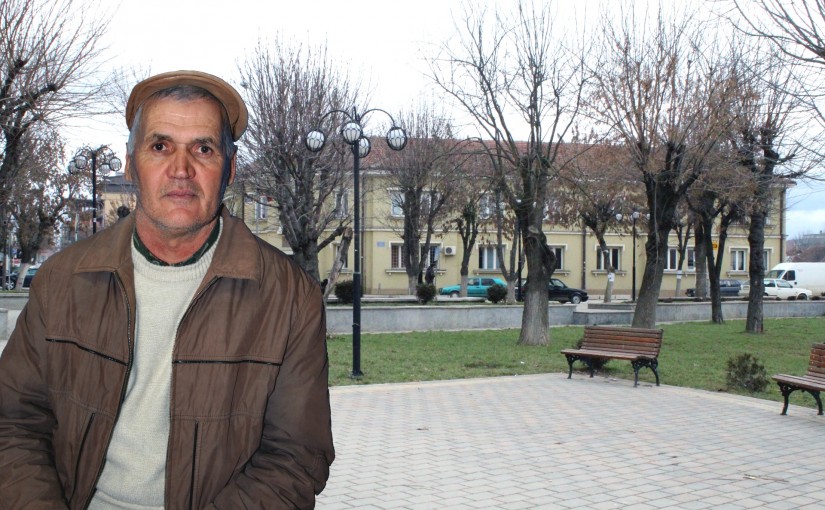For 21 years, Shaban Sfishta returned every paycheck to the Kosovar government in an unmatched effort to help his country through times of war and reconstruction. He says he survived through faith and subsistence farming.
A former chemistry teacher from the northeastern town of Podujeva, Sfishta opted for early retirement last year at age 60. Seeing an unemployment rate of over 40 percent, and its disproportionate effect on young workers, the Kosovar educator believes his decision will make it possible for a newly-hired teacher to earn her bread and impact students.
The teacher’s story coincides with important events in modern Europe. In 1990, the old communist regimes were starting to give way to new democracies. But for Kosova (Kosovo), a troubled decade had just begun as Serbia sent its troops to occupy Sfishta’s homeland.
The Serbian forces launched a crackdown on Kosova’s autonomous government and public institutions. Education in Albanian, the native tongue of the majority ethnic group, became the regime’s main target.
“By denying our access to education, the [regime] hoped to defeat us,” Mr. Sfishta said in a 1999 interview with an Albanian-language newspaper during the Kosova War. “It is not incidental that they would attack the essence of our state—that is, the education system.”
Serbian authorities cut off funding for schools and teachers, virtually banning education in Albanian. In the face of oppression, teachers and education officials throughout the country set up a parallel education system under the Kosova government, which began operating in exile.
While most teachers received no compensation during the early stages of the parallel system, Mr. Sfishta decided to remain unpaid even after the first paychecks came in.
“First, I felt a calling to altruism by the instinct for freedom,” he recalls. “Then, I embraced it consciously and for a cause—for the greater good.”
Many left teaching for better paying jobs—though few were available in those tumultuous times. Mr. Sfishta, on the other hand, stayed, and others, including his own brother Bajram, became involved in the educational system. Bajram oversaw the maintenance of a house that was turned into a high school after the Serbian regime seized the school’s main facilities in an effort to end education in Albanian.
Shaban Sfishta was dedicated to saving the Albanian schools. He admits that he chose an uneasy path in life, but says his generation had to make sacrifices to gain its yearned-for freedom.
In those days of hardship, I had a dream of our forthcoming freedom . . . I had a dream for my people—and no doubt my people would live to see [their freedom].
In fact, Kosovar teachers paid a great price for the country’s liberty. Arguably, the first victim of the Kosova War was an Albanian schoolteacher, killed by Serbian forces in late 1997. Shortly after, an armed conflict broke out between the occupying regime and the newly-formed Kosova Liberation Army. After NATO air strikes in 1999, Serbia agreed to pull its troops out of Kosova, and the tiny European country was set free.
Mr. Sfishta decided to continue his mission well after the liberation. The country’s economy remained in bad shape and the chemistry teacher had to work outside school to make a living.
“After my regular working hours at school, I worked indiscriminately as a farmer, raising crops and livestock, and the like. I was convinced that dignity comes from work,” Mr. Sfishta says.
He is grateful to his wife and daughter as well as his extended family, friends, and colleagues for their continued moral support. “They encouraged me to seek and embrace [universal] human values,” he adds.
Those who know him speak greatly of his dedication to work and his love for the country. According to a recently published biography, Mr. Sfishta missed “not a single day of work in 20 years.”
Although the chemistry teacher is not too fond of publicity, he has approved the publication of the short biography that covers Sfishta’s mission as well as the recent history of Kosova’s struggle for education and freedom.
Ismet Potera, a research fellow at the Kosova Pedagogical Institute, notes in the book that Sfishta sent “a powerful message to the oppressors” who sought to undermine Kosova’s schools. The lead author and editor, Muhamet Reçica, says the chemistry teacher pursued what he believed was his civic duty, prescribed by national and universal values.
Regardless of his motive, Mr. Sfishta fulfilled a unique mission. Unlike most volunteers, he had a “paid” fulltime job; unlike any great donor, he had no income. But the Kosovar teacher gave his contribution when his country needed it the most.
(First published as “A Schoolteacher’s Service to His Country: Donating a Lifetime’s Salary” on GT Worldwide in January 2012. Updated on April 23, 2012.)
Shkurtegëza për këtë postim: http://pli.si/1XLsaMb


